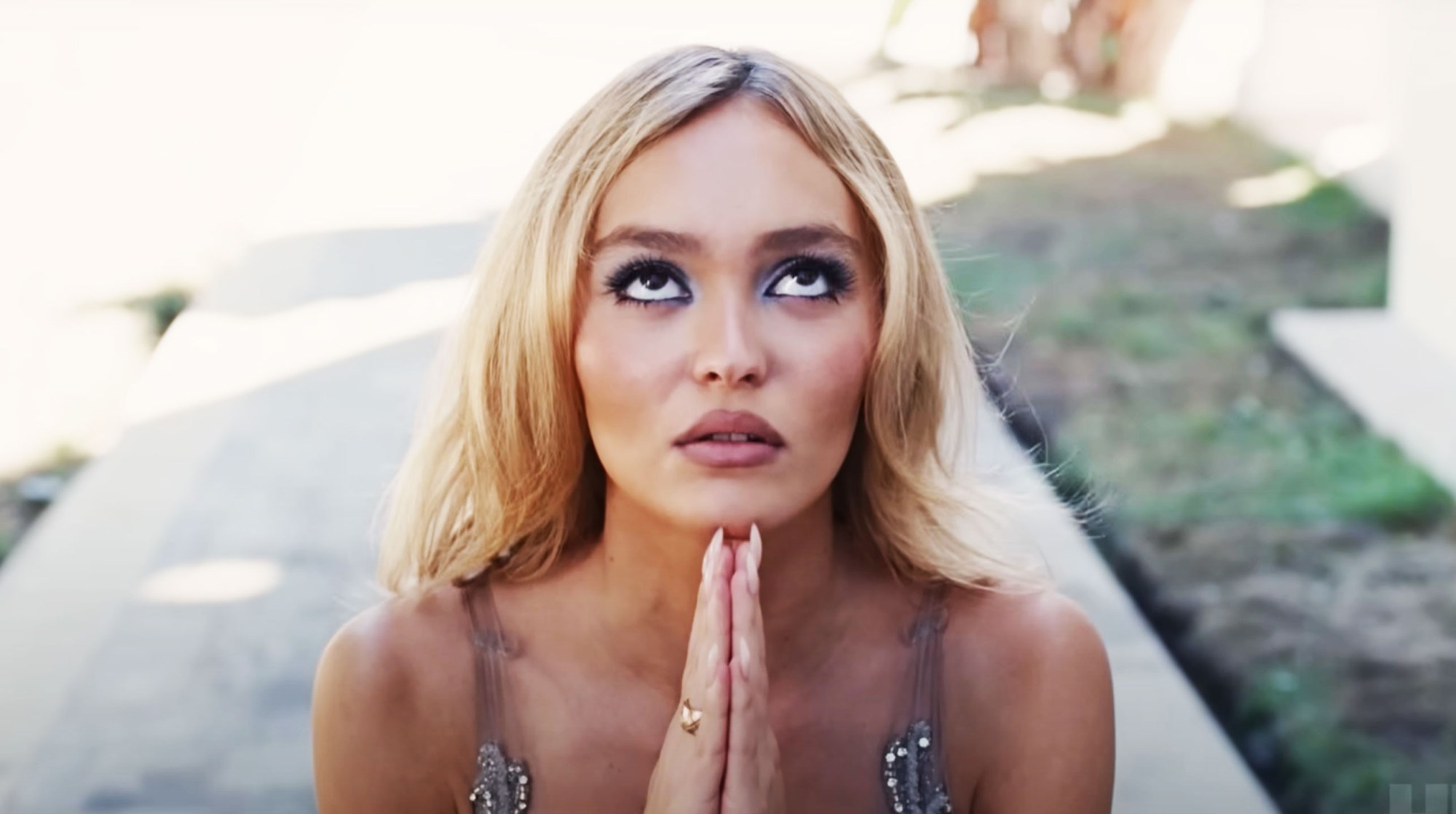It’s almost impressive just how many people Sam Levinson has managed to piss off in just five episodes of his controversial mini-series The Idol. Rotten Tomatoes’ Critics Consensus called it “every bit as florid and sleazy as the industry it seeks to satirise,” and summarised, ahead of the finale last night, that: “The Idol places itself on a pedestal with unbridled style but wilts under the spotlight.” It was condemned for its excessive sex scenes, filled with the kind of dialogue that would make PornHub’s horniest commenters cringe. “It feels like being licked all over by some dirty, drunk club DJ growling ‘nice ass’,” wrote The Times’s Camilla Long, who called the show “a parable of a star eaten by pop”.
The Idol is indeed a parable, but what’s missed in the backlash – understandably, given that every episode seems determined to inspire a wave of thinkpieces examining its apparent sadism when it comes to its female characters, in particular Lily-Rose Depp’s Jocelyn – are the religious undertones of every episode. Notwithstanding the fact the show looks like it bounded off a TradCath Pinterest moodboard and onto our screens, many scenes are laden with religious iconography, and a colour palette – so much red! so much purple! – that wouldn’t look out of place in Vatican City.
Jocelyn is not just a figure of female suffering but a figure that emerges over the course of the season as a kind of doomed Messiah, misunderstood by the sycophants in her entourage but willing to save the waifs and strays that were once Tedros’ followers and are now her own. In this week’s episode, “Jocelyn Forever”, she sits amongst their strange co-sleeping huddle, Last Supper style, galvanising them to save both her and themselves in a record company meeting called as a last-ditch attempt to stop her world tour from being cancelled. An earlier dinner scene, in which Jocelyn reveals her mother’s abuse and saddles Xander with lashings of Catholic guilt, had foreshadowed this Last Supper tableau. In the culmination, one of the lost sheep, Chloe, is wearing a headpiece made of devil horns (Sam Levinson is heavy-handed with his subtext).
But long before this finale moment, spirituality and religion circle Jocelyn. Before her own powerful and explicit performance to save the arena tour, she kneels outside, removing her sandals and praying, eyes towards the sky. When Vanity Fair reporter Talia Hirsch asks who judges her, she replies simply, “God”. When she meets Tedros in his seedy nightclub, they dance to Madonna’s “Like a Prayer”. When Xander betrays his leader, Judas style, he chooses to sing George Harrison’s “My Sweet Lord” and is rewarded by an embrace from Jocelyn, complete with Iscariot-style kiss on the cheek (heavy! handed!).
Assuming it’s deliberate, reading The Idol as a religious parable lends another dimension to the gratuitous suffering Sam Levinson heaps on his female protagonist. Until now, we, the audience, and the critics, have assumed that the show was either about female suffering as voyeurism, or the assumption that suffering leads to art (in the show’s last episode, Jocelyn’s team congratulate her on pushing through the trauma of the past year and creating sellable bangers out of it). But it could also be about suffering as an act of faith, the idea – still as problematic as the others – that pain brings us closer to God. “The pain of women turns them into kittens and rabbits and sunsets and sordid red satin goddesses, pales them and bloodies them and starves them, delivers them to death camps and sends locks of their hair to the stars,” Leslie Jamison wrote in her 2014 essay “Grand Unified Theory of Female Pain”. “Men put them on trains and under them. Violence turns them celestial.” She could have been talking about Jocelyn, years before she was invented and forced to wear red satin and ill-fitting platform heels which force her to bleed, Stigmata-style.
It wouldn’t be the first time Sam Levinson has crucified his characters on the altar of content. In Euphoria, too, faith is an undercurrent. In the Christmas special episodes, which bridged the Covid-mandated gap between seasons one and two, Ali and Rue sit in a diner and get incredibly metaphysical, talking about God and forgiveness, and whether everyone has a purpose. His 2018 film Assassination Nation, which also starred Hari Nef, was a retelling of the religious fervour that led to the Salem Witch Trials.
In fact, taking the show as a popstar-as-messiah parable maybe makes the most sense of all the show’s possible interpretations. After all, we do see musicians as messianic. The show itself was inspired by a boast from Abel Tesfaye to Sam Levinson: “If I wanted to start a cult, I could”. “What he meant is that his fans were so loyal and devoted that they would follow him anywhere,” Sam later explained.
And he’s right. We do see musicians as cult leaders, or religious leaders, or saints. We follow them around the world and pay – particularly in recent years of ticket gouging – thousands to see them sing live. We cry at concerts. We tattoo their lyrics on our bodies. We create shrines to them, online and IRL, and attack those who haven’t yet seen the light of their genius (as anyone who’s ever incurred the wrath of Stan Twitter can attest to). We create prophets and idols out of them, and we worship those idols. It makes sense! Given the power of the popstar, perhaps we should have seen The Idol’s strange finale twist coming.
Obviously, nobody in The Bible had a rat-tail, but even the best writers, whether they created the Gospels or Euphoria, suffer from plotholes.



